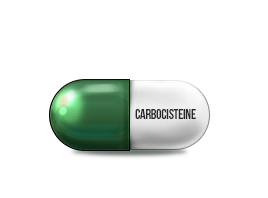Nous acceptons  Carbocisteine
Carbocisteine

Carbocisteine - mucolytic and expectorant the action of which is caused by activation of enzyme of scyphoid cells of mucous membrane of bronchial tubes. It normalizes a quantitative ratio of acid and neutral sialomutsin of a bronchial mucous. Reduces viscosity of a bronchial mucous and sequester from accessory sinuses of the nose, facilitates discharge of expectoration and slime, reduces cough. Promotes regeneration of a mucous membrane, normalizes its structure, reduces number of scyph
- Availability: In Stock (125 packs)
- Active Ingredient: carbocisteine
| Paquet | Par comprimé | Savings | Per Pack | Achetez |
|---|---|---|---|---|
| 120 caps | $33.42 | |||
| 240 caps | $0.26 | $4.56 | $66.84 $62.28 | |
| 360 caps | $0.27 | $4.55 | $100.26 $95.71 |
Carbocisteine (Carbocisteine)
What is Carbocisteine?
Carbocisteine is a medication used to treat respiratory conditions characterised by excessive mucus production and congestion. It is classified as a mucolytic agent and works by thinning and loosening the mucus in the respiratory tract, making it easier to cough up and clear from the airways. This can help alleviate symptoms such as coughing, chest congestion, and difficulty breathing.
How does Carbocisteine work?
Carbocisteine works as a mucolytic agent by altering the properties of mucus in the respiratory tract. It acts on the structure of mucus, making it less sticky and more fluid. This change in mucus consistency helps to break down and thin out the mucus.
Can Carbocisteine treat asthma/COPD?
Carbocisteine is not typically used as a primary treatment for asthma or chronic obstructive pulmonary disease (COPD). It can help in relieving respiratory symptoms associated with excessive mucus production and congestion.
How does Carbocisteine treat asthma/COPD?
Carbocisteine does not treat asthma/COPD directly at its root, however it can relieve some of the symptoms of both asthma and COPD. In asthma and COPD, the airways become inflamed and narrowed, leading to symptoms such as wheezing, shortness of breath, and coughing.
How do I use Carbocisteine?
Carbocisteine Capsules
The specific way that you will use carbocisteine will vary on a number of different factors such as:
The form of carbocisteine that you have
The timing at which you take carbocisteine
The duration of how long you need to use it for
How effective is Carbocisteine?
Carbocisteine is considered to be a highly effective mucolytic agent that can help certain respiratory conditions that are characterised by excessive mucus production and congestion. It is important to note that effectiveness of this medication will vary from person to person based on a number of factors.
How long does Carbocisteine take to work?
The time it takes for carbocisteine to work will vary from person to person. Generally, the effects of Carbocisteine may be noticed within a few days of starting treatment. However, it's important to note that the onset of action and the degree of improvement can vary depending on the individual's condition, the severity of symptoms, and other factors.
Is Carbocisteine safe to use every day?
Carbocisteine is generally considered safe for daily use when it is used correctly. It is important that you read all of the instructions and information provided with your medication to ensure that you are using it correctly.
What is the correct dosage of Carbocisteine?
Carbocisteine 375mg
The dosage of carbocisteine will vary depending on the individual case it is being prescribed to treat. The strength of carbocisteine that you can purchase online from UK Meds is 375mg and you can purchase 120, 240 and 360 capsules.
How much Carbocisteine should I take?
Whilst the specific dosage of carbocisteine will vary from person to person, the typical amount someone should take will be two or three capsules a day. For children, the dosage will vary depending on their weight and age.
Does Carbocisteine have any interactions with other drugs?
Yes, carbocisteine can potentially interact with other medications so it is important that you make your healthcare provider aware of any medications you are already using. Some medications that interact with carbocisteine include some medications used to lower gastric acidity, some antitussive medications and some antibiotics.
What alternative asthma/COPD treatments are available?
There are a number of different asthma and COPD treatments that you can purchase online from UK Meds. Medications such as Ventolin and Salamol are highly effective for treating asthma and COPD symptoms.
What are the potential side effects of Carbocisteine?
Carbocisteine Side Effects
Like with all other medications carbocisteine can cause some side effects. Although it is generally well tolerated there are some side effects that are more common, such as:
Stomach discomfort
Nausea
Vomiting
Diarrhoea
Allergic reactions
Dizziness
If you experience any severe or persistent side effects, or if you are concerned about any symptoms you are experiencing, it is important to consult with your healthcare professional.
Is it safe to take Carbocisteine during pregnancy?
The safety of Carbocisteine during pregnancy is not well-established, and it is generally recommended to exercise caution and consult with a healthcare professional before using Carbocisteine if you are pregnant or planning to become pregnant.
What warnings does Carbocisteine come with?
Carbocisteine may come with certain warnings and precautions. It is important to read the information leaflet that accompanies the medication to ensure that you are clued up on the potential warnings that come with carbocisteine use.
Can you drink alcohol whilst taking Carbocisteine?
Carbocisteine and Alcohol
It is generally recommended to avoid consuming alcohol while taking Carbocisteine. Alcohol can have various effects on the body, including promoting dehydration and potentially irritating the respiratory tract. Since Carbocisteine is used to help manage respiratory conditions and promote mucus clearance, it is advisable to maintain proper hydration and minimise any potential irritants to the respiratory system.
